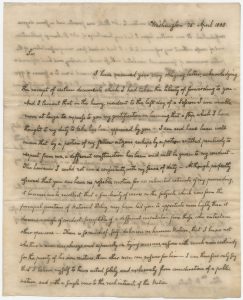by Susan Martin, Processing Archivist & EAD Coordinator
Last year, the MHS acquired a remarkable collection of sixteen letters to William and Caroline Eustis, 1803-1823. The Eustises’ correspondents included four U.S. presidents—Thomas Jefferson, James Madison, James Monroe, and John Quincy Adams—as well as Dolley Madison, the Marquis de Lafayette, and others. Incredibly, five of the letters in this collection were previously unknown to scholars.
Our digital team has digitized all sixteen letters (and transcribed a few), and you can access this content from the collection guide. But I’d like to take this opportunity to inaugurate a series here at the Beehive about this collection, looking at some of the individual letters in more detail.
It’s not hard to see how William Eustis ended up with so many illustrious correspondents. Born in 1753, he worked as a military physician during the Revolutionary War; was elected to multiple terms in the Massachusetts and federal legislatures; and served as secretary of war under James Madison, minister to the Netherlands, and governor of Massachusetts.
In the spring of 1808, Eustis was representing Massachusetts in the U.S. House, and one of the great debates roiling the country was President Thomas Jefferson’s Embargo Act of 1807.
The Embargo Act was passed by Congress on 22 December 1807 in response to violations of American neutrality by England and France during the Napoleonic Wars, including the seizure of ships and the impressment of sailors. The act prohibited American commerce with “any foreign port or place.” Jefferson hoped that, by withholding our goods, he could apply economic pressure to belligerent European powers and thus avert war.
The embargo was a drastic and unprecedented step that inflamed regional tensions. Partisans in New England, the stronghold of the Federalist Party, were outraged because the law severely curtailed their trade and because Congress had passed it in secret sessions. Federalists were also angry at the defection of John Quincy Adams, then a U.S. senator from Massachusetts and a member of their party, who broke ranks and voted for the embargo.
Rep. William Eustis reached out to Adams to express his support. Eustis was a member of the opposing party, a Democratic-Republican, and had even defeated Adams in the House election of 1802. But the two men agreed on the embargo. On 25 April 1808, Adams wrote back to thank Eustis, and it’s this letter that forms part of the MHS collection.

This fascinating letter gives us a window into Adams’s thinking on an extremely contentious issue. He knew his position was unpopular with his constituents, the most outspoken of whom openly impugned his and Jefferson’s motives in the press and voiced “a species of opposition” Adams considered “unwarrantable and […] dangerous.” But Adams sincerely believed the embargo was “dictated by the love of Peace” and would be good for the country.
Which brings us to my favorite passage.
There is so much of self-delusion in human Nature, that I know not whether a man can always, and especially on trying occasions, answer with much more certainty for the purity of his own motives, than other men can answer for him – I can therefore only say that I believe myself to have acted solely and exclusively from considerations of a public nature, and with a single view to the real interests of the Nation.
In other words, human beings are masters of rationalization, especially when making difficult decisions. We like to think well of ourselves. Adams believed he was doing the right thing and for the right reasons, but recognized that we deceive ourselves as much as others are deceived about us, so are we really good judges of our own motives?
Adams’s insight into human nature and his thoughtfulness, not to mention his facility with words, are on full display here. He had clearly wrestled with the decision. This letter, in fact, came at a significant turning point in his political career. His growing disillusionment with the Federalists on this and other issues would soon lead him leave the party altogether and become a Democratic-Republican.
Eustis, Adams, and Jefferson were, in fact, very wrong about the Embargo Act of 1807. The policy was a dismal failure and hurt American markets much more than those of Europe. It was later repealed and replaced with an embargo limited to England and France.
This letter was one the five in the collection previously unknown to historians. However, the Writings of John Quincy Adams, edited by Worthingon C. Ford, includes a few other letters from Adams to Eustis. I’ll close this post with an excerpt from one dated 22 June 1809.
Yes, I believe with you that the first of qualities for a great statesman is to be honest. And if it were possible that this opinion were an error, I should rather carry it with me to my grave, than to believe that a man cannot be a statesman without being dishonest. I have, and must have, confidence in the possible virtue of human nature; and although in entertaining this idea, a man must, and will sometimes, be disappointed, yet if it is coupled with a sound judgment and close observation, I believe he could make fewer great mistakes, than one whose principle is the universal rascality of the species. […] All men profess honesty as long as they can. To believe all men honest, would be folly. To believe none so, is something worse.

